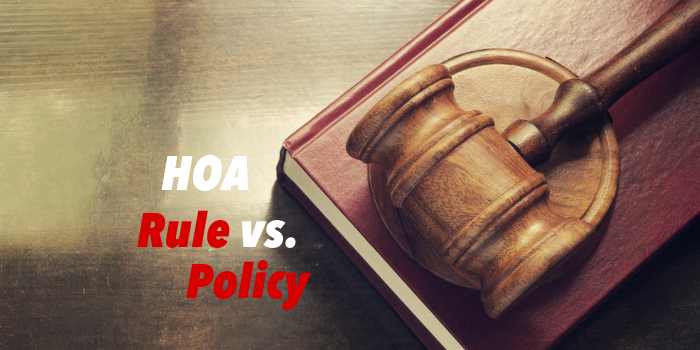Rules and policies are an important part of an association’s governing documents. An association’s governing documents prescribe what the association is, how it runs, what its goals are, and the restrictions home owners agree to abide by while living within the common interest development (CID). As with any hierarchy, there is an order of authority that is followed within these governing documents that reduces confusion and sets precedence in various situations.
Hierarchy of Governing Documents
As a member of the board, it is important to understand the implications of the governing documents and to know of the hierarchy within those documents. Though it isn’t common, it is possible for governing documents to contradict each other. For example, the CC&Rs of an association may contradict the legislative laws if after the HOA was incorporated the legislature passed a bill changing what restrictions are placed on HOAs in that state. In cases like this, a chronological hierarchy is followed based upon which document was written first. Typically, the legal hierarchy is as follows:
- Federal, state, then local laws
- HOA plat/map.
- CC&Rs
- Supplemental declarations
- Any articles of incorporation or a corporate charter
- Bylaws
- Rules and regulations
- General resolutions
- HOA Policy
Following this hierarchy, each governing document is written based upon the restrictions and permissions set forth in the documents preceding it in the hierarchy. Sometimes, these ranks get confused with one another. Two of these that often get confused are rule and policy.
Rules vs. Policies: What’s the Hierarchy Here?
Rules and policies are not the same, but they do have many things in common. Both are enforceable in court, are adopted by the board, and are expressed according to the governing documents that allow for their formation. Policy and rules may often address and define the same issues but in different ways. So, what’s the difference? Let’s look a little closer at their definitions and what they entail.
Policy
HOA policy defines the acceptable community standards. Policy may define responsible parties in situations such as damages to community property or homeowner property maintenance. The processes that regard day to day issues such as money collection, communication guidelines, and conflict escalation and resolution may also be defined in the policies the HOA board has adopted. One thing to remember about policy is that it may never contradict the governing documents of the association.
Rule
Rules are found in the governing documents and may pertain to anything from owner behavior to dates and lengths of board meetings. They may be found in the Bylaws, the CC&Rs, the Rules and Regulations, or General Resolutions. Often times, rules are enforceable, and infringements can be punishable by fines and further legal proceedings such as liens. HOA rules will set forth expected owner behaviors and limitations and restrictions to guest and owner actions within the community. They also provide guidelines for the HOA board in regard to meeting proceedings, voting percentages, and length of service restrictions.
Rules, Policies, and You
As a member of your community, knowing the differences between policies and rules helps you better understand what is asked and required of you. As a board member, understanding the differences between rules and policies will help you be an effective and productive part of your association’s board. You are responsible for the enforcement, change, and creation of the rules and policies that will work best for your community. Knowing the difference will also assist you in the formation, composition, and organization of the rules and policies within the hierarchy of your governing documents. Reviewing the rules and policies often will help you, and the other members of the board, to be aware of any changes that need to be made according to the needs of your community.
Where Your Property Management Company Fits In
Your property management company isn’t responsible for developing the policies and rules for your community, neither are they there to help in assisting with the change or restructure of your governing documents. Your property management company can provide helpful insights from experience with other HOAs in the adherence to state and local laws as you develop the rules and policies your community needs. However, their main role is to implement said policies and rules set forth by your HOA board.








How to l get a copy of our HOA rules.
Do you manage the properties on san Sebastian
Heritage TH/COND
Hi Martha,
SpectrumAM does not currently manage Sebastian Heritage. We hope this helps!